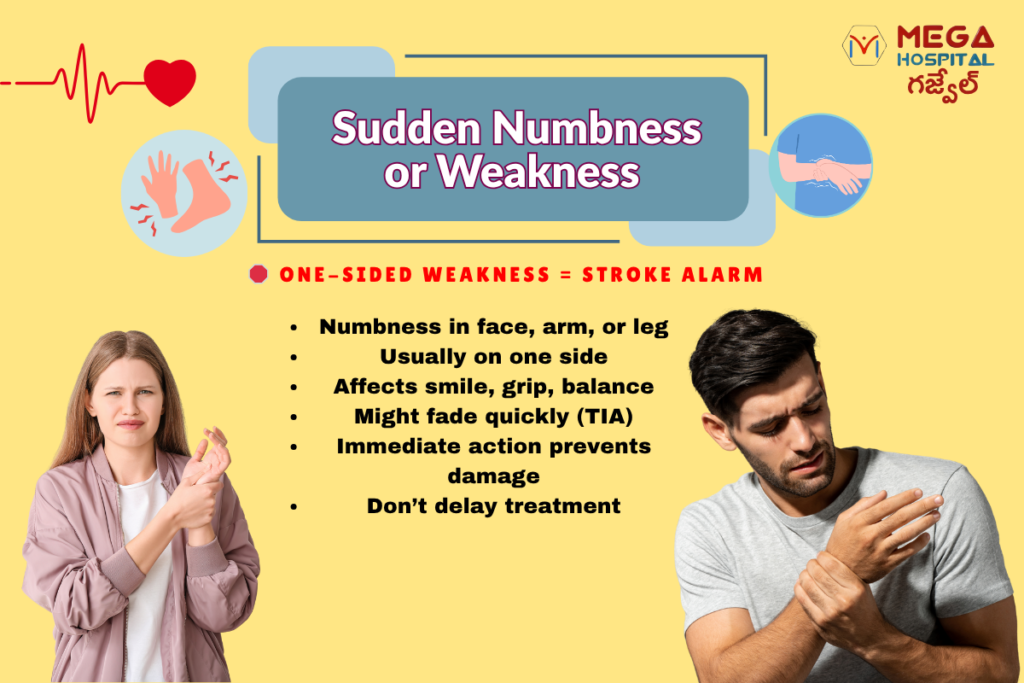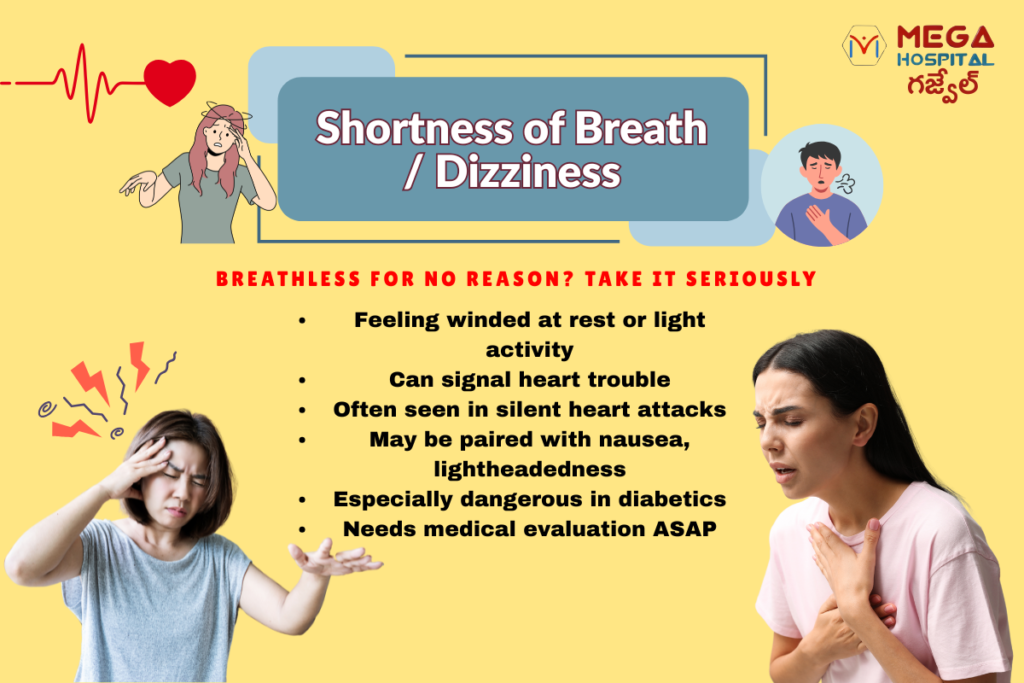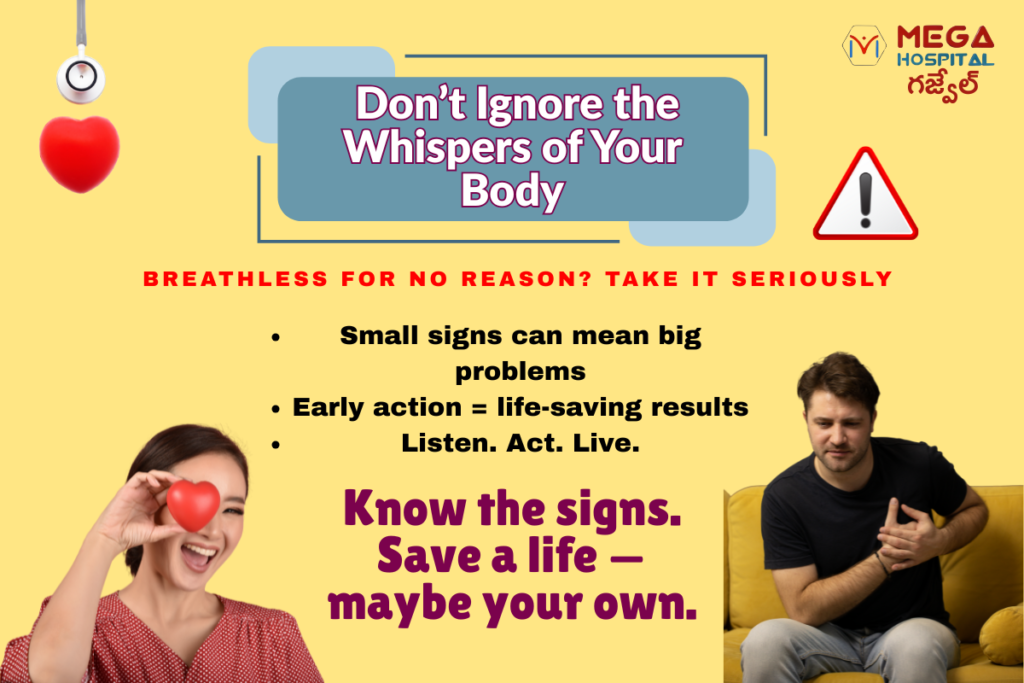Introduction
Some health emergencies don’t always arrive with loud alarms. Conditions like strokes, heart attacks, and other life-threatening issues often start with subtle symptoms that are easy to miss or ignore. Recognizing these “silent signs” early could be the difference between timely treatment and serious consequences. In this blog, we highlight some of the most common yet silent symptoms that you should never take lightly.

1. Unexplained Fatigue – Your Body’s Early Red Flag

Feeling unusually tired without a clear reason can be more than just a bad day. Fatigue, especially in women, is a common early sign of a heart attack. Unlike normal tiredness, this kind of exhaustion may feel heavy, persistent, and worsen with activity. It can occur even when you’ve had enough rest. If it comes along with shortness of breath, chest discomfort, or dizziness, it’s a red flag. It’s your body’s way of signaling that your heart is struggling. Don’t ignore constant fatigue — especially if it feels different from your usual.
2. Sudden Confusion or Difficulty Speaking – Possible Stroke Warning

A sudden inability to speak clearly, understand others, or express thoughts could be a silent symptom of a stroke. These signs often occur without pain and can be mistaken for tiredness or emotional stress. Sometimes, a person may experience sudden memory loss or difficulty focusing. It may come and go quickly (known as a mini-stroke or TIA), but it’s still a serious warning. Even temporary confusion or slurred speech should be treated as a medical emergency. Timely action can prevent permanent brain damage or worse. When in doubt, act fast.
3. Jaw, Neck, or Back Pain – A typical Heart Attack Symptom

While chest pain is the most recognized sign of a heart attack, pain in the jaw, neck, or upper back is often overlooked. This type of pain may start slowly and not feel intense, which makes it easy to ignore. It’s especially common in women and the elderly. It can be a dull ache or even pressure that moves around. If it’s accompanied by shortness of breath, sweating, or nausea, seek medical help immediately. This unusual discomfort can signal a heart that’s not getting enough oxygen. Silent doesn’t mean safe — listen to your body.
4. Sudden Numbness or Weakness – Especially on One Side

If you suddenly experience numbness or weakness in the face, arm, or leg—especially on one side of the body—it could be an early stroke symptom. Many people dismiss it as a pinched nerve or fatigue. This loss of strength may affect walking, speaking, or even smiling. A stroke interrupts blood flow to the brain, and this symptom indicates which part is affected. Even if it fades away quickly, it might have been a transient ischemic attack (TIA), which often leads to a full stroke. Immediate treatment can save brain function and even life.
5. Shortness of Breath or Lightheadedness – Hidden Heart Distress

Breathlessness while resting or doing light activity is not normal and could indicate heart trouble. Many people assume it’s anxiety or age, but it might be your heart struggling to pump properly. This symptom is often seen in silent heart attacks, especially among diabetics and older adults. It may be accompanied by dizziness, nausea, or sweating without chest pain. Some people feel faint or like they’re going to pass out. If you feel winded without clear reason, don’t ignore it — get checked. Your lungs and heart could be trying to alert you.
Conclusion

Our bodies are incredibly good at giving us signals when something is wrong — but not all warnings are loud or obvious. Silent symptoms like fatigue, confusion, odd pains, or breathlessness can be the first signs of serious conditions like strokes and heart attacks. Recognizing these early and taking timely action can make a life-saving difference. Listen closely to your body, and never hesitate to seek medical help when something doesn’t feel right.
Frequently Asked Questions (FAQs)
1. Are silent symptoms more common in women?
Yes, women often experience atypical symptoms like fatigue, jaw pain, or nausea during heart attacks.
2. Can strokes happen without warning?
Yes, mini-strokes or transient ischemic attacks (TIAs) can occur with subtle or brief symptoms.
3. Should I go to the hospital for mild chest pain?
Yes. Even mild or unusual chest discomfort could be a sign of a heart condition.
4. How fast should I act if I suspect a stroke?
Immediately. Use the FAST rule (Face drooping, Arm weakness, Speech trouble, Time to call emergency).
5. What tests help detect silent heart issues?
ECG, stress tests, echocardiograms, and blood tests are commonly used to diagnose hidden heart problems.

